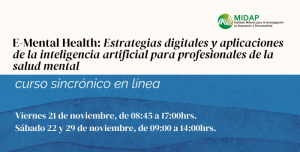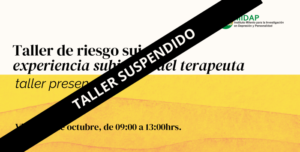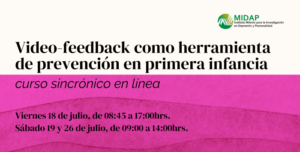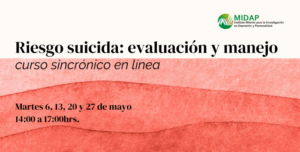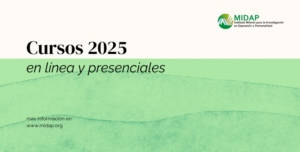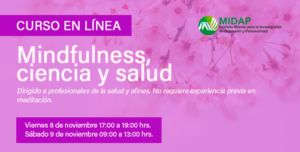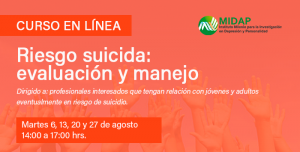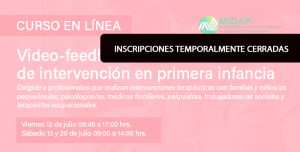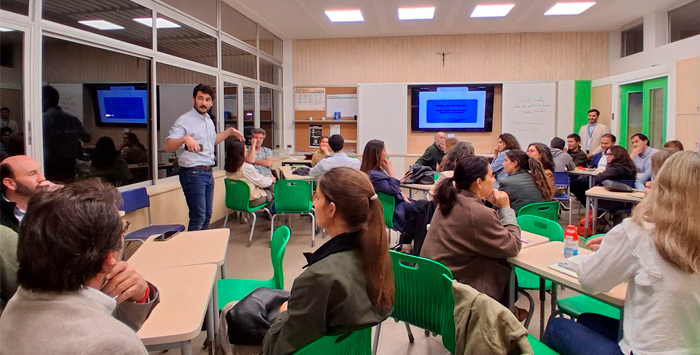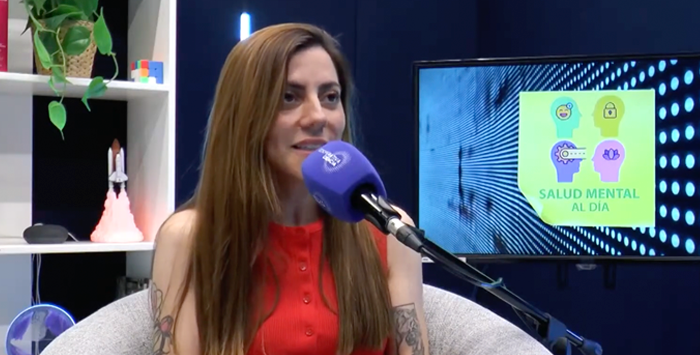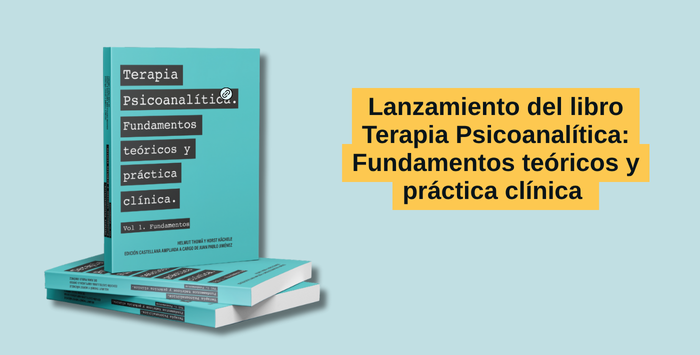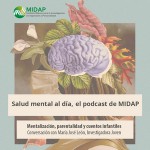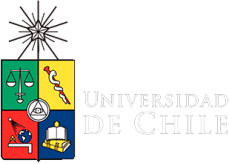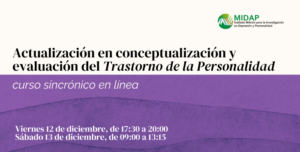
NUEVO CURSO MIDAP: Actualización en Conceptualización y Evaluación del Trastorno de la Personalidad
DESCRIPCIÓN GENERAL Este curso tiene como objetivo brindar una actualización integral sobre los últimos avances en la conceptualización del Trastorno de la Personalidad (TDP), partiendo desde los modelos categoriales clásicos del DSM-5 (Sección II) hasta los enfoques contemporáneos dimensionales reflejados en el Modelo Alternativo para Trastornos de la Personalidad (AMPD) y la Clasificación Internacional de Enfermedades (CIE-11). Esta base permite comprender la evolución conceptual del TDP, promoviendo una mejor integración teórica y clínica. A continuación, se profundiza en las dos áreas nucleares del Modelo Alternativo para el Diagnóstico de Trastornos de la Personalidad (AMPD), el Criterio A, que evalúa los niveles de funcionamiento de la personalidad enfocados en la identidad y el funcionamiento interpersonal y el Criterio B, que aborda los rasgos disfuncionales presentes en los trastornos de la personalidad (Sharp & Wall, 2021). El curso busca instalar competencias clínicas sólidas para la identificación y evaluación clínica tanto de los niveles de funcionamiento como de los perfiles de rasgos disfuncionales, fundamentales para un abordaje diagnóstico y terapéutico preciso y actualizado, como se ha evidenciado en estudios que respaldan la validez y utilidad clínica de estos criterios (Krueger et al., 2014; Morey et al., 2015). La última parte del curso está orientada al entrenamiento en el uso de instrumentos actuales para el tamizaje y evaluación del TDP, centrándose en el uso e interpretación de herramientas validadas como el LPFS-BF 2.0 (Level of Personality Functioning Scale–Brief Form) y el PID5BF+M (Personality Inventory for DSM-5–Brief Form Plus Modified). Se presentan casos clínicos y ejemplos de resultados para fortalecer la aplicación práctica de estas herramientas, las cuales cuentan con evidencia empírica que avala su eficacia y eficiencia en contextos clínicos (Hopwood et al., 2018; Zimmermann et al., 2019). Este curso es una oportunidad para actualizar y profundizar el conocimiento teórico y práctico en la evaluación del TDP costo-eficaz, contribuyendo a una práctica clínica basada en evidencia, integrada y sensible a las complejidades actuales de los trastornos de la personalidad. En concordancia con lo expuesto, el Instituto Milenio para la Investigación en Depresión y Personalidad – MIDAP MIDAP- ofrece el curso en modalidad remota “Actualización en Conceptualización y Evaluación del Trastorno de la Personalidad”, buscando entregar contenidos teóricos y prácticos fundamentales para la identificación del Trastorno de la Personalidad en diversos contextos, incluyendo servicios públicos y privados. DIRIGIDO A: Psicólogos clínicos y psiquiatras (también profesionales afines) que buscan actualizar sus conocimientos teóricos y técnicos para la detección confiable del Trastorno de la Personalidad. OBJETIVO GENERAL: Entregar contenidos teóricos y prácticos iniciales para la identificación del Trastorno de la Personalidad en diversos contextos, incluyendo servicios públicos y privados. OBJETIVOS ESPECÍFICOS: METODOLOGÍA: Organiza: Con el apoyo de: CONTENIDOS Y HORARIO: DÍA 1 / VIERNES 12 DE DICIEMBRE 17:30 – 17:45 Presentación inicial 17:45 – 18:30 Unidad I: Fundamentos teóricos y transformaciones recientes en el diagnóstico de Trastorno de la Personalidad. El camino hacia el DSM-5 (Sección II)El desarrollo del Modelo Alternativo para Trastornos de la Personalidad (AMPD) y el modelo dimensional del CIE-11. 18:30 – 18:40 Pausa 18:40 – 19:55 Unidad II: Los Niveles de Funcionamiento de la Personalidad (Criterio A y B – AMPD) Presentación en profundidad del AMPD.Criterio A: Niveles de Funcionamiento de la Personalidad Funcionamiento del Self/Identidad (auto-concepto, sentido de dirección y autocrítica)Funcionamiento interpersonal (empatía, intimidad e hipersensibilidad interpersonal)Criterio B: Rasgos Disfuncionales de la Personalidad y Facetas (Afectividad Negativa, Desapego, Antagonismo, Desinhibición, Psicoticismo y Anankastia). DÍA 2 / SÁBADO 13 DE DICIEMBRE 09:00 – 11:00 Unidad III: Estado actual de la evaluación por instrumentos del Trastorno de la Personalidad Últimos desarrollos y prácticas obsoleta (o con baja evidencia de confiabilidad y validez incremental) Tamizaje inicial con el Sistema de Síntomas Transversales de Nivel 1 (APA-Level-1 Cross-Cutting Symptom Measure – Adult)Evaluación instrumental de los Niveles de Funcionamiento de la PersonalidadLevels of Personality Functioning Scale (LPFS-BF 2.0)Evaluación instrumental de los Rasgos Disfuncionales de la PersonalidadEl Personality Inventory for DSM-5 (PID5BF+M) 11:00 – 11:15 Pausa 11:15 –12:00 Unidad IV: Aplicación práctica, paso a paso del procedimiento diagnóstico Aplicación del Level-1 Cross Cutting Symptom MeasureAplicación del LPFS-BF 2.0Aplicación del PID5BF+M 12:00 – 13:00 Unidad V: Interpretación e integración de resultados. Uso de planilla Excel para cálculo de puntajes automatizadoFormulación de casoComunicación diagnóstica y psicoeducación 13:00 – 13:15 Preguntas y discusión. *Puede haber modificaciones de horario y/o fechas por razones de fuerza mayor. DOCENTE: Dr. Alex Behn. Psicólogo Clínico, MSc. y Doctor en Psicología Clínica, Columbia University. Profesor Asociado de la Escuela de Psicología UC. Director del Instituto Milenio para la Investigación en Depresión y Personalidad (MIDAP). Ex Vice-Presidente de la International Society for the Study of Personality Disordrs (ISSPD). Principales líneas de estudio: Psicopatología básica de trastorno límite de la personalidad, investigación en psicoterapia, tecnología y salud mental, salud mental y educación superior. BIBLIOGRAFÍA BÁSICA: Banyard, H., Behn, A.L., & Delgadillo, J. (2021). Personality Disorders and Their Relation to Treatment Outcomes in Cognitive Behavioural Therapy for Depression: A Systematic Review and Meta‑analysis. Cognitive Therapy and Research 45:561–576 https://doi.org/10.1007/s10608-021-10203-x. Hein KE, Dennis SJ, Folger LF, Mullins-Sweatt SN. (2024). Perception of stigma across diagnostic models of personality pathology. Personal Disord. 15(5):332-340. doi: 10.1037/per0000678. Hopwood, C. J., Thomas, K. M., Markon, K., Wright, A. G., & Krueger, R. F. (2018). DSM-5 personality traits and DSM-IV personality disorders. Journal of Abnormal Psychology, 127(3), 209-218. DOI: 10.1037/a0026656. Krueger, R. F., Derringer, J., Markon, K. E., Watson, D., & Skodol, A. E. (2014). The Personality Inventory for DSM-5—Development and Validation of Scale Construction. Journal of Personality Disorders, 28(4), 455–469. Labbé, N., Vaccarezza, S., Nuñez, C., Zimmermann, R., & Behn, A. (2025). Psychoeducational interventions for borderline personality disorder: A scoping review. Personality Disorders: Theory, Research, and Treatment. Advance online publication. https://dx.doi.org/10.1037/per0000729. Natoli, A. P., Bach, B., Behn, A., Cottin, M., Gritti, E. S., Hutsebaut, J., Lamba, N., Le Corff, Y., Zimmermann, J., & Lapalme, M. (2022). Multinational Evaluation of the Measurement Invariance of the Level of Personality Functioning Scale–Brief Form 2.0: Comparison of Student and Community Samples Across Seven Countries. Psychological Assessment. http://dx.doi.org/10.1037/pas0001176. Sharp, C., & Wall, K. (2021).

